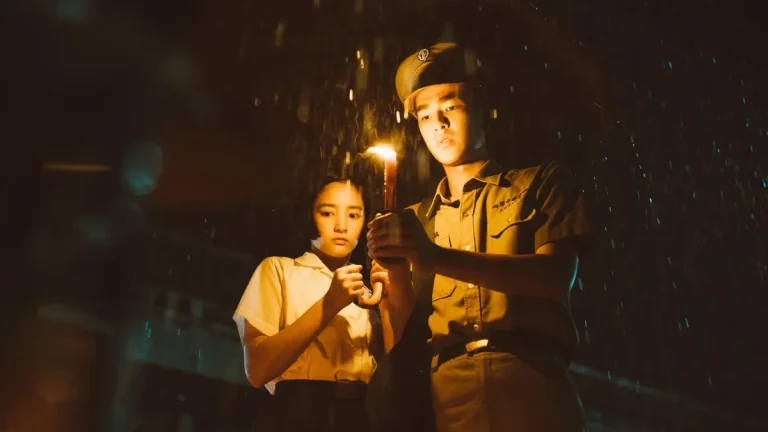The North-East states – the ‘seven sisters’- are the focus of Anubhav Sinha’s ‘‘Anek’’. The title incorporates the acronym ‘NE’, but also sheds light on how this part of India, long been at the center of hate crimes, discrimination, and racial slurs, can be brought within the fold. The geopolitical space has lived under the shadow of AFSPA for nearly 60 years, creating a feeling of alienation from the rest of the country. The film doesn’t waste any time in letting the viewers know the degree of racism the people here go through. But before we could even get a sense of place, the film cuts to one of its many over-convoluted storylines.
We meet Ayushmann Khurrana’s Aman, disguised as an undercover agent Joshua, whose goal is to bring the biggest insurgent group in the region to the table for a peace accord. What’s the difference between peace and a peace accord? What does the government really want? These are among some of the many questions Aman goes through in his journey into knowing the deeply rooted systemic rot. He feels the government should talk to the group that is the people’s voice but finds that the officers back in Delhi are more interested in winning over the group that creates the most noise and bloodshed. Following his boss (Kumud Mishra), Abrar Butt (Manoj Pahwa) remains keen on sharing political power with leader Tiger Sangha (Loitangbam Dorendra) for the sake of semblance.
Related to Anek – Fire in the Mountains [2022] Review: A Clash of Science and Religion in an Underprivileged Community
In the middle of the constantly shifting political ties, Aman tries doing something similar, as the agent is in a relationship with Adio (Andrea Kevichusa), the daughter of a school teacher (Mipham Otsal) who is running a covert operation against the State. It’s a fairly conventional part that the actor has played in multiple films (including in Sinha’s own “Article 15”) where after being reminded of his privileged persona, the character goes through an inward journey by empathizing with the problems of people around him. But here, the morally-ambiguous protagonist is reduced to throwing heavy expository dialogues through uneven and sparse voiceovers. Ayushmann physically fits into the role well, but his tics- especially the exaggerated sniffs- come across more as a distraction than anything else. There’s also Adio’s character arc- she wants to become a champion boxer and win a medal for the country despite being discriminated against because of her regional identity. This in itself creates a metaphor for how her identity is in a constant fight against odds that remain beyond her physical control. Towards the end of the film, it also provides a sheathing irony of how sports tend to unite us all, giving the minorities a means to ‘prove’ their nationality. These are all fairly neat touches, but the film simply suffers from having way too many of them.
In recent years, it’s become increasingly more difficult for artists to circumvent the hate-brewing machinery of both the state and the media. Thus, whenever an ‘important’ sociopolitical film comes along ever so rarely, it becomes a curious exercise to look at its true merit by breaking down various aspects. In doing so, “Anek” sticks out as it creates a curious dissonance between filmmaking ambition and rather pedestrian themes (although essential) that crashes into a hotchpotch of a screenplay. The movie might come across as a step in the right direction, but how can a film so unfocused in its central theme, create a lasting impact on the larger consensus? Even when a movie’s intentions may all be evidently virtuous, it’s the overall execution that decides whether the film is taking the audience along a righteous journey to look within, or whether it’s just simply looking down upon that very audience. The talk between the government officials about building a statue, making a film on a surgical strike, and having momos in the middle of a conflict zone will make you titter. But they merely seem like lines written out of frustration (and understandably so) into the screenplay while looking at the newsreels and editorial pieces.
Anubhav Sinha by all means has mastered the art of portraying impending chaos on screen. He’s one of the few current Indian filmmakers who has turned his personal jargon and moral-political views into a version of his own personal language. All his recent films contain multiple scenes that eventually form the bedrock of emotional weight in the narratives due to the sheer hard-hitting intensity he brings in placing his subjects on screen. His third-time collaboration with cinematographer Ewan Mulligan in “Anek” renders the country scape into a claustrophobic maze, cleverly creating a visual divide the inhabitants in the region feel towards the rest of the country.
Also, Read – Puzhu [2022] ‘SonyLIV’ Review: A brooding deconstruction of privilege
There’s a breathtaking sequence in the middle of a forest shootout that ends in a pile of dead bodies placed under a tree. I was left numb. In the film’s last act, Sinha upends the conventional hyper-jingoistic route of showing a surgical strike according to the recent norms and adroitly grounds it in a way that also doesn’t come across as anti..army? It might not seem like a huge deal but certainly makes for a risky line to tread on in today’s India. The unnamed State in the movie is set in mirrors the collective ignorance of the rest of India to even carefully consider each one of these States separately. But there are far too many angles here bombarded with exposition and a sheer lack of proper world-building. Hence, “Anek” at times falls into the zone of patronizing its viewers more than making them empathize with the delicate situation persisting throughout the North East.
In my review for “The Kashmir Files“, I wrote how filmmakers can’t keep treating important events in history like a kitchen-sink scenario. In “Anek”, the kitchen sink seems filled with rusty (yet timely) political soft-spot narratives that are thrown randomly to create some sort of pushback against the current status quo. For instance, the movie tries to weave in a Kashmir narrative by bringing into focus the ‘special status’ thread that unites the region in the Northeast. There’s even a character who belongs from Srinagar. On paper, it’s a wise attempt at killing two birds with one stone. But like most of its subplots and narrative threads, the film doesn’t do any justice to this one as well.
“Anek” has got its heart in the right place and certainly is a film that needs to be watched by people in theaters due to the cinematic elements it provides. But it’s also an extremely exhausting watch – and not always in the right ways. It provides a surface-level exploration of the conflated politics of our time that often gets confined to the debate of a ‘national language’. By casting people from the North-Eastern region and providing them with (partly cooked) character arcs, the film makes us empathize with how it feels when you’re repeatedly asked to prove your love and worth for the country. It lacks the determination and vision of “Article 15“, but is very much capable of opening difficult conversations in the hope of awakening a national conscience. That’s something we all could use in today’s sociopolitical space.
Trailer
Anek (2022) Movie Links – IMDb, Wikipedia
Anek (2022) Movie Cast – Ayushmann Khurrana, Andrea Kevichüsa, Amir Hossain Ashik, Azzy Bagria, Mubashir Bashir Beigh, J.D. Chakravarthi, Jatin Goswami, Manoj Pahwa, Kumud Mishra



![I Trapped the Devil [2019] Review: An unengaging genre film serving as an allegory for alienation](https://79468c92.delivery.rocketcdn.me/wp-content/uploads/2019/04/I-trapped-The-Devil_HOF-768x324.jpg)


![Fashionista [2017]: Fantasia Film Festival Review](https://79468c92.delivery.rocketcdn.me/wp-content/uploads/2017/08/1257888_Fashionista-Amanda-Fuller-1.jpg)
